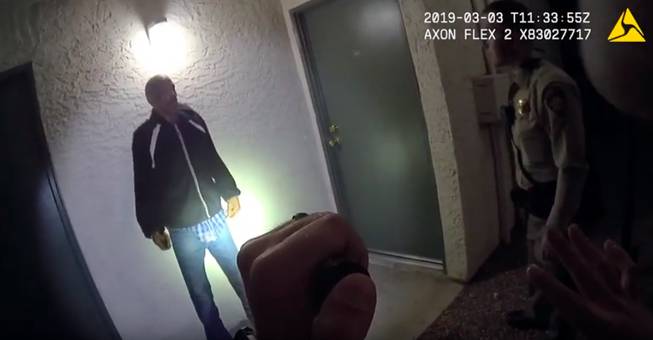
METRO POLICE
Roy Scott is shown in this screen grab from video before he was handcuffed by police.
Friday, Oct. 9, 2020 | 8 p.m.
A federal lawsuit filed this week in Las Vegas blames the death of a 65-year-old paranoid schizophrenic man on a Metro Police officer who, for 95 seconds, pinned the man down with his knee, exerting unnecessary pressure on his back and neck.
The Clark County Coroner’s Office ruled last year that Roy Anthony Scott's death in police custody was caused by methamphetamine intoxication, with paranoid schizophrenia and cardiovascular disease playing a significant role.
But by showing a jury previously unreleased body-camera footage and expert testimony, the Scott family's legal team aims to prove that the officers’ actions significantly contributed to his death on March 3, 2019.
Related content
“It was the restraint, including the weight on his back and neck, that we believe will be found to be his cause of death,” said attorney Peter Goldstein in a phone interview and by email Friday.
About 3 a.m. the day of his death, Scott summoned police to his apartment near Sahara Avenue and Valley View Boulevard. He told a 911 dispatcher that there were men standing outside his unit, at least one of whom was armed, Metro said last year.
Officer Kyle Smith and Officer Theodore Huntsman arrived to find nothing out of the ordinary and knocked on Scott’s second-floor apartment. He initially refused to come out, telling them to kick in the door, which they didn’t because they could not hear any commotion inside, police said.
The officers walked downstairs, and Scott eventually came out, holding a metal pipe, police said. When they told him to drop it, he did.
Asked if he was armed, Scott said no but then handed an officer a knife he had in his pocket. He apologized and said he was paranoid schizophrenic.
To further search Scott, officers tried to handcuff him, but he resisted, telling them to “please” leave him alone and asking, “Why are you all doing this to me?,” according to video released by Metro.
He said “please” 63 times in eight minutes “before becoming motionless,” the complaint said.
Goldstein, who filed the lawsuit Wednesday on behalf of Rochelle Scott, Roy Anthony Scott’s daughter, said they obtained additional footage not broadcast to the public.
The complaint says that four minutes after they first put a knee on Scott’s neck and back, it appears as if he went into “some kind of seizure.”
Seconds later, Scott twice was heard asking for water. About a minute later, his feet stop moving, and seconds later he “appears dead,” according to the complaint.
One officer is heard saying Scott is still breathing, while to other replies, “He’s barely breathing.”
About 10 seconds later, as Scott appeared to be unconscious, an officer summoned medics. At no time did either officer or their backup attempt CPR on Scott.
An ambulance arrived six minutes after it was called, and video shows medics doing chest compressions in the vehicle, the complaint said. Scott died at 4:38 a.m., police said.
“He didn’t commit a crime. He was the one who called police,” Goldstein said.
Metro last year said both officers were trained in crisis intervention. “The idea that they used that level of force for someone who was not a threat and who they knew was sick is inexcusable,” Goldstein said.
Goldstein said he aims to refute the coroner’s report with an independent forensic pathologist and a “police procedures expert.”
“The cause of death as stated in the coroner's report is not consistent with what we see in the body cam,” Goldstein said.
The nine-count complaint names Metro, Smith, Huntsman and unidentified officers. Its allegations include excessive force, battery, negligence and disability discrimination.
Metro policy dictates that it does not comment on pending litigation.
We want justice, obviously, Goldstein said, noting that Scott’s daughter was struggling with her loss. “We want a jury to decide this case, not public opinion.”
